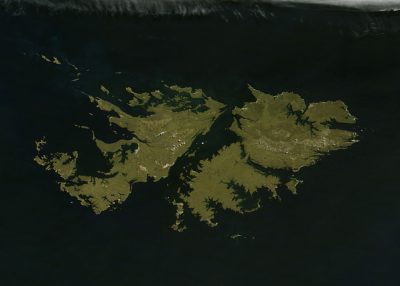Brexit Could See the Return of the Falkland Islands to Argentina

The Islas Malvinas, or more commonly known as the Falkland Islands, archipelago was invaded by the United Kingdom in 1833 and its occupation has continued to date. Argentina’s claim for sovereignty through diplomatic means has been a state policy since the failed liberation attempt through military means in 1982. Although it lost intensity during the Mauricio Macri government, President Alberto Fernández of the leftist Justicialist Party, reinforced in October his commitment to “renew the claim of sovereignty” of the 750 islands of the archipelago. In a patriotic tone, the then presidential candidate criticized the relations Macri had with the United Kingdom during a debate that took place on October 13.
“In these years the government has been very busy doing business with the United Kingdom and has forgotten sovereignty [over] the Falklands. Over 700 soldiers have died there. In memory of them all I will make things different,” Fernández said during the first Argentine presidential debate.
Fernández will re-establish a Secretariat for the Malvinas, demonstrating that he is taking the issue against the British very seriously. During his swearing in speech before the National Congress on December 10, the new president informed that he will create a Secretariat, with the participation of “all political forces,” the southern province of Tierra del Fuego that is closest to the Malvinas, representatives of the academic world and former fighters of the 1982 war, to concentrate on the reclamation of the occupied archipelago.
Fernández included the claim by the Falkland Islands in his speech when he assumed the presidency and said “there is no more place for colonialism in the 21st century.”
“We know that for this task it does not reach the mandate of a Government, but a medium and long-term State policy, so I will convene a Congress where all political forces participate,” he announced.
Fernández decision to re-establish the Malvinas Secretariat and to convene a Council on the subject restores confidence and firmness in Argentina’s demand against the British after complete servitude by Macri. The importance the new president has given to Argentina’s demand for sovereignty over the islands is a good sign and it is the first time a new president has spoken with such depth to the Malvinas issue when they first take office.
Fernández’s stance demonstrates that the Malvinas do not belong to any president, they are a state matter in which it is necessary to work as a state policy for not only the present, but also looking to the future. The establishment of the Secretariat is aimed to positively re-establish consensus on the basic of and essential demand for sovereignty, leaving the differing approaches in Argentina to the cause and the 1982 war conflict in the past with the aim of looking only towards the future.
It must be remembered that a new Sao Paulo-Malvinas flight opened on Argentine National Sovereignty Day on November 20, a massive slap in the face to the Argentinian veterans from the 1982 war, who did not hesitate to go out protest. LATAM inaugurated the flight which has a stop in the Argentine city of Córdoba. War veterans protested in front of the Foreign Ministry in Buenos Aires against what they described as treachery by Macri. Fernández has an opportunity to gain even more popular support by forcing the cancellation of flights by LATAM to the Malvinas and by ensuring the islands have no lifeline except with their colonial masters in London approximately 13,000 kilometers away.
Conservative Boris Johnson won the British election on December 12, which put the South American islanders on alert. The possibility of the definitive implementation of Brexit will harm the local economy, whose production has the European Union as one of its main markets. Brexit is a favorable situation for Argentina because in the view of the European Union, the Malvinas are an extracontinental territory, something that will complicate the local economy, just as what will happen with British-occupied Gibraltar on the Iberian Peninsula and areas in Cyprus.
In this context Argentina must start seeking new alliances with European countries and condemn the maintenance of a British colony on the complete opposite side of the Atlantic and with total impunity. With Spain wanting the return of Gibraltar and Cyprus wanting the return of Akrotiri and Dhekelia, Argentina can very easily find new allies in the European Union willing to cooperate efforts to reclaim sovereignty over territory occupied by the British. Brexit therefore not only threatens the breakup of the United Kingdom with a push for Scottish independence and Irish unification, but it could potentially see the return of the Malvinas to Argentina.
*
Note to readers: please click the share buttons above or below. Forward this article to your email lists. Crosspost on your blog site, internet forums. etc.
This article was originally published on InfoBrics.
Paul Antonopoulos is a Research Fellow at the Center for Syncretic Studies.
Featured image is from InfoBrics

